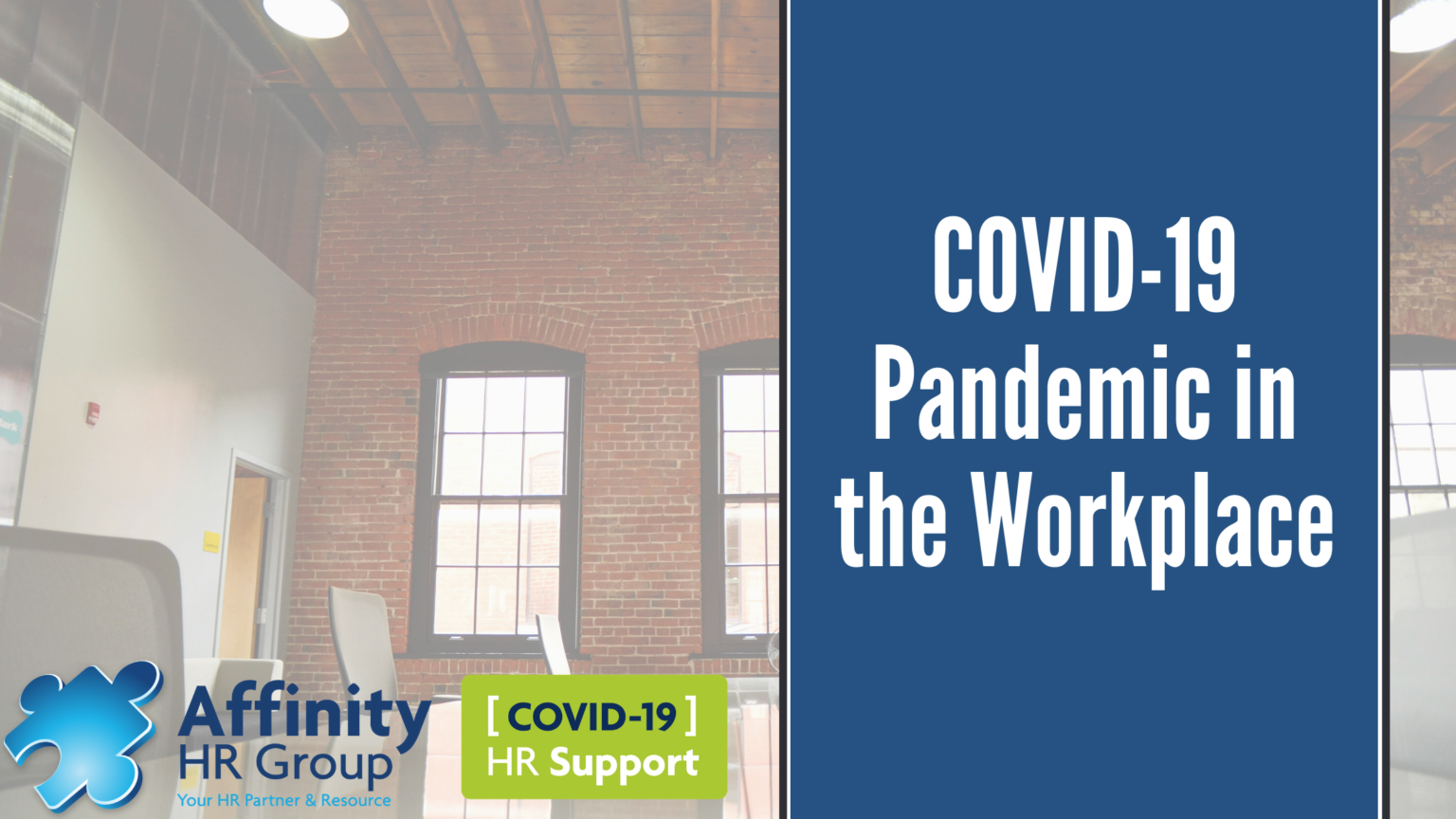As the COVID-19 pandemic continues and businesses reopen under restrictions which vary by city, county, and state, Affinity HR Group continues to monitor several topics and issues to help our clients through these confusing times. Below are some of the current topics we are seeing.
Employer COVID Liability: Employees being in the workplace increases their exposure to COVID-19 which means they may be able to make an unsafe workplace claim or a claim against your Workers’ Comp policy, for example. To help mitigate some of that liability, take all possible safety measures to reduce the employees’ risk of exposure.
While some states have passed legislation to help protect employers, this legislation will not provide blanket immunity as companies must comply with certain criteria such as following COVID-19 safety precautions for coverage.
Some companies are requiring employees to sign liability waivers, but these do little to reduce legal exposure if challenged. Conversely, it may indicate to your employees that you do not have confidence in your safety measures which may make employees more concerned about coming to work.
Mask mandates: If you have a mask-wearing mandate for employees and visitors, whether due to state regulations or company safety practices, enforce those requirements consistently for the health and safety of your employees and customers. Also, give your employees the support when refusing to deal with a customer without a mask.
Vacation / Paid Time Off: Some employees may want to start using their PTO, requiring you to ensure you have control of several aspects.
Confirm your policies allow you to control who is taking time (usually through an approval process) to ensure proper coverage at all times. Do not use only first-come, first-served or seniority as reasons for approval; include reason for time off as some employees will need time off for critical events such as weddings, funerals, and taking their child to college.
Consider implementing temporary carryover or payout policies so employees do not have to choose between taking unwanted time off and losing their benefits.
We recommend not requiring employees to exhaust all of their PTO, especially if all of the FFCRA time has been exhausted, so they have time available if they become sick later in the year.
Travel: As states reopen, employees may begin to travel, increasing their chance of exposure. Traveling may necessitate the employee to self-quarantine and/or get tested. If an employee is planning to travel, discuss the repercussions such as use of paid time off, quarantine period, testing, etc. prior to departure so they know the expectations before they leave.
If traveling for work, consider the true need or value of the travel and postpone if possible. You will need to pay their regular wages for any quarantine time, and, if they are exposed, it will most likely fall under your Workers’ Comp.
If traveling for vacation, decide ahead of time if you will require the employee to stay away from the office, to get tested, and, if / how all this time will be paid.
Back-to-school / summer camp: Employees may not have child care options if summer camp or child care is not available, and this may not improve if schools cannot reopen full-time in the fall. Communicate with employees to create a plan of action such as intermittent schedules, shorter days, or working weekends.
For employees who have time available, FFCRA / extended FMLA continues for up to 12 weeks but, if the closed child care provider changes (i.e., school to summer camp to school), require the employee to submit a new FFCRA request form with documentation of that closure.
Screening / Testing: There are several options for screening and/or testing employees before returning to work and/or before each shift.
- Screening: A brief questionnaire and/or taking of their temperature, usually before each shift, assesses the employee’s health each day by monitoring for the common symptoms of COVID-19. Anyone who has concerning symptoms can be sent home until further determination can be made. Screening is non-invasive and needs to be done consistently, but it will not reveal employees who may be asymptomatic and positive.
- COVID-19 Testing: A nose-swab test for active COVID-19 virus is usually done if the employee is showing symptoms or after possible exposure. Since some areas are struggling to meet demand, employees may not be able to get a test without a qualifying reason; if they do, it could take several days to get the results. Testing only tests the presence of the virus at a point-in-time, and a negative result does not mean the employee will not get it in the future. Testing can only be required if there is a risk of transmission to other people.
- COVID-19 Antibody Test: A blood test to determine if there are antibodies showing previous infection. Not all tests are reliable, and a positive result does not mean they will not get it again in the future. This test cannot be required as it violates ADA.
Our Recommendations:
- Allow anyone who can to work from home for as long as possible to reduce chance of exposure in your office and to keep work flowing as there would be a much smaller chance of employees getting sick and being out for several days or weeks.
- Require and enforce consistent safety protocols: screening, social distancing, face masks, no large groups, no small, closed spaces, hand sanitizer, and hand washing, etc.
- Require employees to speak up immediately if they are not feeling well. Review the symptoms and procedures for possible illness and exposure and send home if there is a question.
- Paid time off and extended FMLA under FFCRA is still applicable. Offer it to anyone who needs it that has time remaining.
We are always monitoring the current situation to share the latest information with you. But, since every company’s situation is different, please reach out to Affinity HR Group so we can help you navigate your specific issues.
By Paige McAllister, SPHR, SHRM-SCP, Vice President HR Compliance – Affinity HR Group, Inc.





